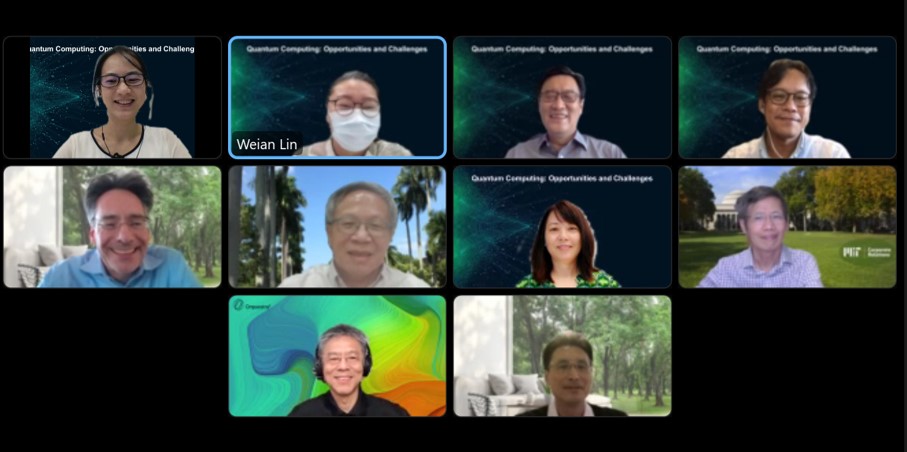Quantum computer is one of the most forward-looking and promising topics worldwide. Its powerful computing advantages can accelerate the innovative applications of many technologies and bring revolutionary developments to the industry. Therefore, every major country is in full swing in the quantum computing competition, hoping to gain a place in this field. National Taiwan University and the Massachusetts Institute of Technology held an online workshop "Quantum Computing: Opportunities and Challenges" on August 10. Professor Pai-Chi Li, VP of Office of Research and Development, and Director of Industry Liaison Office, NTU said in his opening speech: "Quantum computing research is highly valued because it provides possibilities for groundbreaking, transformative solutions. The technologies can benefit various industries and set the stage for developing a broader spectrum of applications. How to commercialize the research work and apply them to the real world is just as important as the research work itself. The market size of quantum computing is projected to be over one billion US dollars by 2026, attracting many industry players and startups. In today’s workshop, hosted by the Industry Liaison Office, NTU, we have invited not only experts from MIT and NTU to talk about their research, but also two quantum startup companies to share their experiences in using advanced quantum technologies to develop innovative solutions and create business opportunities. While the research on quantum computing in Taiwan is in the early stage, the active investment of other countries in various quantum-related technologies has aroused the attention of domestic industries, prompting them to make plans to maintain a leading position.

Photo 1: Group photo of workshop speakers and guests
In the first half of the seminar, Dr. William D. Oliver, Professor of Electrical Engineering and Computer Science, Professor of Physics, and Director of Center for Quantum Engineering from MIT first introduced the development of quantum computers. Compared to classical computers, quantum computers potentially can solve complex problems in a wide range of fields, including finance, material science, pharmaceuticals, etc. It has a great impact on future information and economic development, hence the race of building a universal fault-tolerant quantum computer. Professor Oliver discussed different ways of building quantum computers, as well as their advantages, future potential, and challenges. Next, two quantum technology startups, Zapata Computing Inc. and Quantum Diamond Technologies, Inc. respectively shared their experiences in how they use quantum technologies in software and hardware to create new business models and opportunities and provided their unique services and products.
In the second half of the seminar, Professor Hsi-Sheng Goan from the Department of Physics, NTU, and the Director of IBM Quantum Hub at NTU introduced and analyzed the development and opportunities of quantum technology in Taiwan. Quantum computing is a new algorithm that requires talents and resources in a wide range of fields, including computer science, software engineering, mathematics, circuit design, and materials science. Since the Ministry of Science and Technology announced the decision to invest in quantum computers in 2018, hundreds of millions have been devoted to research and development annually. In 2020, the Ministry of Science and Technology further joined hands with the Academia Sinica and the Ministry of Economic Affairs and focused on topics including the components of quantum communication, the research platform of quantum computing and cryptography, hardware technology, core facilities, science promotion, and talent cultivation. Several national quantum R&D teams have been ensembled, with the target to build Taiwan's self-made quantum computers and communication network systems, which will drive the developments in chip manufacturing, packaging and testing, cooling systems, communication networks, software packages, cloud computing, financial technology, etc. It requires a huge amount of investment and talent to welcome the quantum era. Next, Professor Yuan Chung Cheng from the Department of Chemistry, NTU introduced the application of quantum computing in material design. The progress of materials science is an important part of historical evolution. However, the number of possibilities for chemical combinations is enormous. If quantum computing can simulate different chemical structures and compositions, and show the properties of the materials, the efficiency of material design can be greatly improved. Professor Cheng reviewed the latest achievements of quantum computing in materials science, including the basic principles of these revolutionary developments. He then proposed appropriate strategies for realizing the vision of quantum computing given the current predicament, hoping to utilize the powerful capabilities of quantum computing in the future and design novel materials to solve major problems in human society.
The moderator, Distinguished Professor of the Department of Physics, NTU, and the first Director of IBM Quantum Hub at NTU, Ching Ray Chang closed the workshop with the following remarks: "Today's workshop provides a comprehensive discussion on quantum computer hardware, software, and the developments in Taiwan. It is estimated that we will reach quantum ecology in ten to fifteen years, which means that everyone will be affected by it. The most important thing at the moment is to invest the required resources as soon as possible, to enhance our competitiveness, and to popularize the relevant knowledge of quantum technology.” The workshop attracted many researchers and industry experts from various fields to communicate with the speakers. The enthusiastic exchange and discussion not only reflects the importance of quantum technology but also is expected to create more sparks of industry-university collaboration.